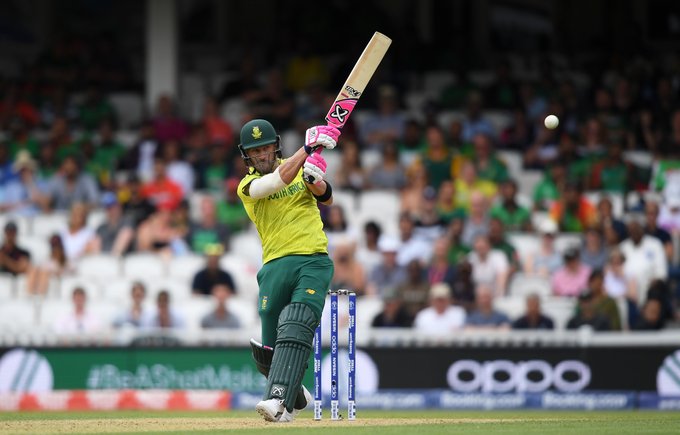The Proteas’ star batsmen need to take more responsibility when chasing big targets if they want to stay in the hunt for the World Cup, writes JOHN GOLIATH.
The Proteas have a terrible record chasing big scores at the Cricket World Cup.
On the 11 occasions when the South Africans were set scores of 250 or more, they’ve only managed to get over the line twice. They chased down India’s 253 in 1999, before all-rounder Robin Peterson hit a six in the 50th over to surpass India’s total of 297 in the 2011 edition.
In their first two matches of this World Cup, the Proteas lost to England by 104 runs and to Bangladesh by 21 runs after the opposition piled up 311 and 331 runs respectively at the Oval. Losing regular wickets at crucial times, and a lack of composure and match awareness were their downfall in both chases.
It’s a familiar story that has played itself over and over again since the country’s debut in the 1992 World Cup.
The Proteas have a better record chasing scores, winning 17 times in 31 matches. They have lost 12 matches batting second, while two of those matches were tied. But compared with Australia’s three defeats in 22 matches batting second, it’s clear why the South Africans haven’t yet won the World Cup.
South Africa’s record in knockout matches, as well as in ‘do-or-die’ group games, batting second is not great.
The rain and the ridiculous calculating system used at the 1992 World Cup got the better of the team, but in the next couple of tournaments they managed to make a complete mess of their run chases.
In 1996, the Proteas were blitzed by a fine Brian Lara century, but would have still backed themselves to chase the 265 runs for victory. In the end they fell 19 runs short, with three players getting starts, but not converting their totals in big scores.
In 1999, Australia set the Proteas a gettable 213 in their epic semi-final at Edgbaston. After a nervy start, Jacques Kallis pulled things together for the Proteas. However, Kallis lost his wicket on 54 when trying to hit Shane Warne over the top. It was an unnecessary risk after Shaun Pollock had hit the leg-spinner for a four and a six earlier in the over. It was also the second-last ball of Warne’s spell. The Proteas eventually tied the match and were dumped out of the World Cup.
In 2003, the Proteas had to win their final group game against Sri Lanka in Durban to stay in the tournament, but ended up with a tie after they messed up the Duckworth-Lewis calculations. The home team got knocked out before Super Six stage.
The Proteas chased again in the 2011 quarter-final against New Zealand in Dhaka, Bangladesh. They were set a modest 222 to win, but ended up fluffing their lines again. Kallis was again the in-form batsman, but lost his wicket with his score on 47 when he tried to hook Tim Southee to the furthest past of the ground, only for Jacob Oram to take the catch on the mid-wicket boundary. Faf du Plessis then managed to run out AB de Villiers, and South Africa lost by 49 runs.
In the first two matches of this World Cup in England, it seems as if the Proteas haven’t learned from those previous mistakes in big run chases.
Quinton de Kock and Du Plessis top-scored for South Africa against England and Bangladesh respectively. They played really well for their respective 60s and looked very comfortable at the crease. Both played loose strokes, both lost their wickets, and both ended up costing the Proteas victory.
Yes, other batsmen also played some awful strokes, but De Kock and Du Plessis needed to score centuries and guide the team home. They failed take on the required responsibility.
At the moment it doesn’t seem like this Proteas team have a plan when chasing big scores. Much like their predecessors at previous World Cups. A former player once said that they also never talked about chasing scenarios in the dressing-room, and it looks like that hasn’t changed either.
But it’s a rather simple concept. Batsmen need to score centuries in big run chases. Someone needs to take that responsibility and bat deep. Good-looking 40s, 50s and 60s aren’t good enough.
South Africa can’t afford to lose many more matches at this World Cup. It’s time for the senior batsmen to come to the party.







